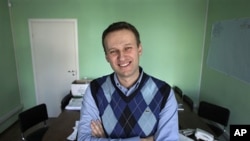With oil earnings flooding into Russia, corruption is at a record high. Transparency International ranks Russia on a par with Cambodia and the Central African Republic as being among the most corrupt countries in the world. But a 34-year-old lawyer is taking on the system.
Tapping on the keyboard of a computer laptop, Alexei Navalny is known as the biggest whistleblower on corruption in Russia. Not an easy road to travel in a country ranked as one of the world’s most corrupt nations.
But this is an election year in Russia. Out-of-control corruption tops the list of concerns of Russia’s growing middle class.
Navalny, a standard bearer of Russia’s post-Soviet generation says corruption is now everywhere in Russia.
High level corruption rarely makes an appearance on television because the Kremlin tightly controls TV news in Russia. As a result, Navalny uses the Internet, still largely free.
Last fall, while Navalny was on a fellowship at Yale University, he posted documents on his blog alleging that officials at Transneft, Russia’s state oil pipeline company, had stolen $4 billion earmarked for the construction of Russia’s first pipeline to China.
He says his blog registered one million visitors, and several thousand people posted comment. Facing that kind of audience, Prime Minister Vladimir Putin called for an investigation into Transneft.
After 700,000 on-line viewers watched a Navalny debate on corruption, censored from state-controlled television, Russia’s political split was clear: between the young, "Youtube" generation and the older TV generation.
On his website, Navalny calls United Russia, the party of Prime Minister Putin, “the party of thieves and crooks.”
The head of Transparency International's Russia office, Elena Panfilova, says the Internet allows Navalny to draw thousands of supporters to his anti-corruption campaign.
“It is all about personal courage and certain way of understanding," said Panfilova. "I believe people back him and support him. He has incredible sense of how to find information, and he does not over-extend himself.”
Panfilova says Navalny’s popularity reflects growing anger in Russia over corruption by government employees.
“The ultimate goal of those activities of Alexei and ours, is to change the bigger policy of governance,” she said.
Russian officials respond in different ways. President Dmitry Medvedev, who is expected to position himself as a reformist in presidential elections next March, now speaks out against corruption.
At a meeting broadcast on national television March 30, he warned state officials: “Corruption’s grip is not weakening, it has the whole economy by the throat.”
Transneft, the state pipeline company, has taken a different position, taking Navalny to court.
Transneft spokesman Igor Demin, referring to Navalny as a "fascist," says the figure of $4 billion comes from what he calls "lazy" journalism.
In a country where crusading journalists and lawyers often end up dead, Navalny says he is not scared and will not back down.
“If everyone was scared, we would have a hard time living,” he said.
All the same, Navalny says he has given his wife a list of telephone numbers to call, just in case he disappears.




